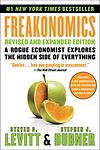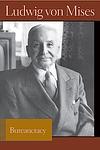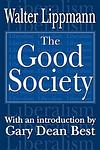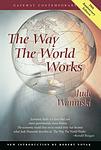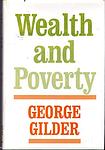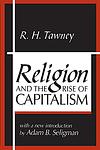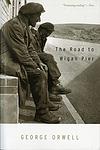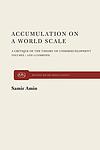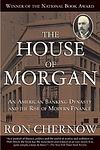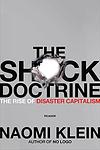The Greatest "Economics, Nonfiction" Books of All Time
Click to learn how this list is calculated.
This list represents a comprehensive and trusted collection of the greatest books. Developed through a specialized algorithm, it brings together 305 'best of' book lists to form a definitive guide to the world's most acclaimed books. For those interested in how these books are chosen, additional details can be found on the rankings page.
Genres
Economics is a category of books that explores the production, distribution, and consumption of goods and services. It delves into the principles of supply and demand, market structures, and the role of government in regulating economic activity. Books in this category may cover topics such as macroeconomics, microeconomics, international trade, finance, and economic history. They provide insights into how economic systems work and how they impact individuals, businesses, and society as a whole.
Countries
Date Range
Reading Statistics
Click the button below to see how many of these books you've read!
Download
If you're interested in downloading this list as a CSV file for use in a spreadsheet application, you can easily do so by clicking the button below. Please note that to ensure a manageable file size and faster download, the CSV will include details for only the first 500 books.
Download-
26. Nickel And Dimed by Barbara Ehrenreich
The book is a firsthand journalistic account of the author's experiment to survive on minimum wage jobs in America. She gives up her middle-class life to understand the reality of low-wage workers, working as a waitress, a hotel maid, a cleaning woman, a nursing home aide, and a retail chain employee. The book reveals the harsh and often overlooked conditions of the working poor, highlighting the struggle to afford even basic necessities, the lack of job security, and the physical toll of such work.
The 2208th Greatest Book of All Time -
27. Freakonomics by Steven D. Levitt, Stephen J. Dubner
This book explores the hidden side of everything, debunking conventional wisdom and revealing surprising connections between seemingly unrelated things. It uses economic theories to explain social phenomena such as the decrease in crime rates in the 1990s, the impact of a person's name on their life outcomes, and the inner workings of drug gangs. By using data and statistics, it challenges the way people think about the world and encourages them to question the accepted truths in society.
The 2612th Greatest Book of All Time -
28. The Economy of Cities by Jane Jacobs
"The Economy of Cities" explores the concept of urbanization and its impact on economic development. The author argues that cities are the primary drivers of economic growth and innovation, challenging the traditional belief that rural agriculture is the foundation of economic development. The book delves into the history of city development, the role of cities in fostering innovation, and how urban economies evolve and adapt over time. It further discusses the importance of diversity and small-scale entrepreneurship in creating vibrant, sustainable cities.
The 2666th Greatest Book of All Time -
29. Bureaucracy by Ludwig von Mises
"Bureaucracy" is a critical examination of the structure and function of bureaucracies in both the public and private sectors. The author argues that bureaucratic management, with its focus on rules and regulations, is not only inefficient but also stifles innovation and individual initiative. He further contends that these problems are inherent in the nature of bureaucracy itself and are not simply due to poor management or corruption. The book also explores the impact of bureaucracy on economics, politics, and society as a whole.
The 2694th Greatest Book of All Time -
30. The Good Society by Walter Lippmann
"The Good Society" is a critical examination of the economic and political systems of the 20th century, with a focus on capitalism and socialism. The author argues that both systems have inherent flaws and suggests a third way, a form of democratic socialism, which would combine the best elements of both systems. The book offers a comprehensive analysis of the economic, social, and political structures of society, and presents a vision for a more equitable and just society.
The 2697th Greatest Book of All Time -
31. The Way the World Works by Jude Wanniski
"The Way the World Works" is an in-depth exploration of political economy, presenting an argument for supply-side economics. The author suggests that economic growth is primarily influenced by the reduction of barriers in production, including lower tax rates. The book presents historical examples to support this theory, arguing that government intervention often leads to economic instability. This text is considered a fundamental work in supply-side economics and has had a significant influence on economic policy discussions.
The 2895th Greatest Book of All Time -
32. Wealth and Poverty by George Gilder
"Wealth and Poverty" is an influential exploration of the economic and social theories that drive the wealth distribution in the United States. The book argues that supply-side economics and capitalism are the most effective systems for creating wealth and reducing poverty. It criticizes welfare programs and other forms of government intervention, asserting that they discourage individual initiative and are counterproductive in the long run. The book also discusses the moral and religious implications of wealth and poverty, emphasizing the importance of values such as discipline and the work ethic.
The 3045th Greatest Book of All Time -
33. No Logo by Naomi Klein
This book explores the negative effects of corporate branding and globalization. It critiques the marketing strategies of large corporations, arguing that they exploit workers and manipulate consumers. The author also discusses how these corporations have a significant influence on culture and public space. The book suggests that consumer activism and grassroots movements can serve as effective counter-forces to corporate power.
The 3167th Greatest Book of All Time -
34. Working by Studs Terkel
"Working" is a collection of over 100 interviews conducted with people from all walks of life about their jobs. The book provides a unique perspective on the daily grind, as it explores the experiences, thoughts, and feelings of individuals in various professions. The interviews reveal the mundane, the challenging, and the rewarding aspects of work, offering a deep understanding of the complexities of the working world. The subject matter ranges from blue-collar jobs to professional careers, giving voice to the often unheard stories of everyday workers.
The 3426th Greatest Book of All Time -
35. Religion And The Rise Of Capitalism by R. H. Tawney
"Religion and the Rise of Capitalism" is a comprehensive exploration of the historical relationship between the development of capitalism and the evolution of religious thought, particularly Protestant Christianity. The author delves into the moral and ethical dimensions of capitalism, arguing that its growth was significantly influenced by certain religious ideas. The book also discusses how religious beliefs have shaped economic systems and societal norms, and how these, in turn, have impacted religion.
The 3437th Greatest Book of All Time -
36. The Road to Wigan Pier by George Orwell
This book is a sociological exploration of the bleak living conditions among the working class in Lancashire and Yorkshire, England, in the 1930s. The author, who lived among the people, vividly describes the hardships of the poor and criticizes the systems that make them so. The latter part of the book presents a discussion on class and possible socialist solutions to the issues presented in the first part. It's a powerful critique of British society at the time and a call for better conditions for the working class.
The 3462nd Greatest Book of All Time -
37. A Theory Of The Consumption Function by Milton Friedman
This book presents a groundbreaking study of the consumption patterns of individuals and households. The author challenges the traditional Keynesian consumption function which posits that individuals and households adjust their consumption spending in response to changes in income. Instead, the author proposes the "Permanent Income Hypothesis," asserting that consumers' spending habits are determined not by current income but by their longer-term income expectations. This influential theory has had a significant impact on economic policy and remains a cornerstone of macroeconomic theory.
The 3462nd Greatest Book of All Time -
38. I'll Take My Stand by Twelve Southerners
"I'll Take My Stand" is a collection of essays by twelve authors who passionately defend the agrarian lifestyle and traditional Southern values against the encroachment of industrialization. They critique the effects of the industrial revolution on Southern society, arguing that it undermines the region's culture, economy, and environment. The book is a plea for the preservation of the agrarian way of life and a critique of the materialistic, consumer-driven culture that they believe is eroding the soul of the South.
The 3741st Greatest Book of All Time -
39. The Tyranny Of Distance by Geoffrey Blainey
"The Tyranny of Distance" explores the impact of geographical isolation on Australia's history, economy, and society. Blainey delves into how the vastness of the continent has shaped the country's development, from the challenges faced by early settlers to the struggles of maintaining connections with the rest of the world. Through a comprehensive analysis, the book highlights the unique circumstances and opportunities that arise from Australia's geographical position, ultimately offering a thought-provoking perspective on the nation's past and future.
The 3791st Greatest Book of All Time -
40. Accumulation On A World Scale by Samir Amin
"Accumulation On A World Scale" by Samir Amin is a thought-provoking analysis of the global capitalist system and the dynamics of accumulation. Amin explores the historical development of capitalism, its inherent contradictions, and the ways in which it perpetuates inequality and exploitation on a global scale. He argues that the capitalist system is fundamentally flawed and unsustainable, offering alternative perspectives on economic development and proposing radical changes to create a more equitable and just world.
The 3791st Greatest Book of All Time -
41. Behind the Beautiful Forevers: Life, Death, and Hope in a Mumbai Undercity by Katherine Boo
This book is a gripping narrative that provides an in-depth look into the lives of residents in a Mumbai slum, focusing on their struggles and aspirations. The author paints a vivid picture of the harsh realities of poverty, corruption, and inequality, while also highlighting the resilience and hope of the inhabitants. The narrative is a powerful exploration of the complexities of modern India, revealing the stark contrast between the country's booming economy and the grim living conditions of its underprivileged citizens.
The 4092nd Greatest Book of All Time -
42. Theory of Games and Economic Behavior by John Von Neumann
This book is a groundbreaking work that applies mathematical methods to the study of economic behavior. It introduces the theory of games, a mathematical framework for analyzing conflict and cooperation between intelligent rational decision-makers, and its implications for economic behavior. The book covers topics such as zero-sum games, utility theory, and the minimax theorem, and it has had a profound impact on economics, political science, and other social sciences.
The 4151st Greatest Book of All Time -
43. An Essay on the Principle of Population by Thomas Robert Malthus
This influential work explores the theory that population growth will always tend to outrun the food supply and that betterment of humankind is impossible without strict limits on reproduction. The author argues that poverty, disease, and starvation are all necessary to keep societies from moving beyond their means of subsistence. The book's grim outlook and controversial theories have sparked significant debate and criticism since its publication.
The 4151st Greatest Book of All Time -
44. The House of Morgan by Ron Chernow
"The House of Morgan" is a comprehensive history of the Morgan banking dynasty, tracing its origins from the 19th century to its present-day status. The book explores the family's influence on American and international finance, politics, and society, highlighting key figures and events. It provides an in-depth look at the workings of high finance and the power dynamics within the Morgan family, offering insights into the world of banking and the people who shaped it.
The 4401st Greatest Book of All Time -
45. Grundrisse: Foundations of the Critique of Political Economy by Karl Marx
This book is a thorough critique of capitalism as an economic system, providing a comprehensive analysis of its structure and consequences. The author delves into the nature of commodities, labor, money, and capital, and explores the complex relationships between these elements. The book also offers a critical examination of the capitalist mode of production, the division of labor, and the exploitation of the working class, arguing that these aspects of capitalism lead to social inequality and economic instability. The author advocates for a socialist system as a more equitable and sustainable alternative to capitalism.
The 4688th Greatest Book of All Time -
46. The Shock Doctrine: The Rise of Disaster Capitalism by Naomi Klein
This book explores the concept of "disaster capitalism", the idea that global capitalism thrives on disaster and chaos. The author argues that free market policies are often pushed through while countries are reeling from wars, natural disasters, or economic crises. She provides a historical analysis of these events, from Chile in the 1970s, to Russia in the 1990s, to the war in Iraq, demonstrating how governments and corporations exploit these periods of shock to implement economic reforms that would otherwise be rejected.
The 5000th Greatest Book of All Time -
47. The Poverty of Power by Barry Commoner
The book in question critically examines the interlinked crises of energy, economy, and ecology facing the United States in the 1970s, arguing that the capitalist system, with its reliance on fossil fuels and unsustainable growth, is fundamentally at odds with environmental protection and social equity. The author contends that the pursuit of profit has led to the concentration of wealth, energy shortages, pollution, and the degradation of natural resources, ultimately resulting in a form of poverty characterized by a lack of power for the majority to effect change. The work calls for a radical restructuring of societal values and energy policies to prioritize renewable resources, conservation, and a more equitable distribution of wealth and power.
The 5080th Greatest Book of All Time -
48. Entropy by Jeremy Rifkin, Ted Howard
"Entropy" is a thought-provoking exploration of the second law of thermodynamics, also known as entropy, and its implications for society, economy, and the environment. The authors argue that our current economic systems and society are unsustainable due to the continuous consumption of energy, leading to increased disorder and waste. They propose a radical shift towards a more sustainable and equitable society, emphasizing the need for renewable energy sources, recycling, and energy conservation. The book serves as a compelling call to action for a more sustainable future.
The 5378th Greatest Book of All Time -
49. The Economic Consequences of the Peace by John Maynard Keynes
This book is a critique of the Treaty of Versailles, written by a British economist who was part of the British delegation to the peace conference. The author argues that the harsh reparations and economic measures imposed on Germany after World War I were unfair and would lead to economic instability and another war. He suggests that a more just and economically sound approach would have been to rebuild Germany and integrate it into the global economy, rather than punishing it.
The 5738th Greatest Book of All Time -
50. London Labour and the London Poor by Henry Mayhew
This book provides a comprehensive look into the lives of the working poor in 19th century London. The author offers an in-depth analysis of the socio-economic conditions of the time, detailing the struggles and hardships faced by the city's lower classes. The book includes interviews with a wide range of people, from street-sellers and chimney sweeps to beggars and thieves, offering a vivid and often grim picture of Victorian London. It is considered an important social document for its first-hand account of the realities of urban poverty.
The 5738th Greatest Book of All Time
Reading Statistics
Click the button below to see how many of these books you've read!
Download
If you're interested in downloading this list as a CSV file for use in a spreadsheet application, you can easily do so by clicking the button below. Please note that to ensure a manageable file size and faster download, the CSV will include details for only the first 500 books.
Download
